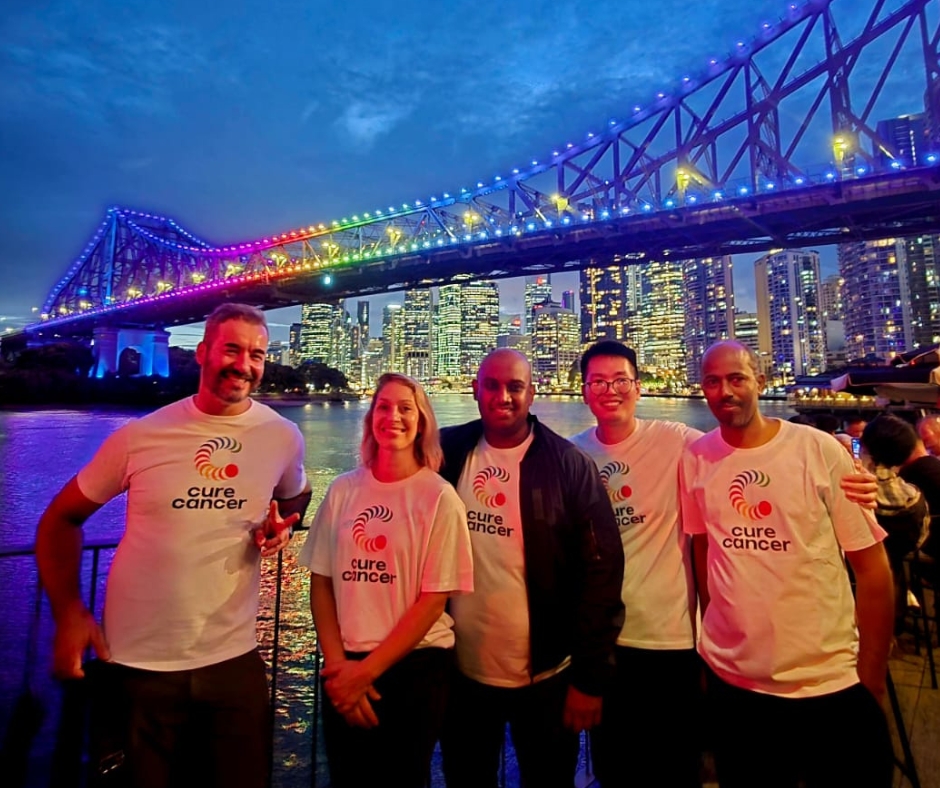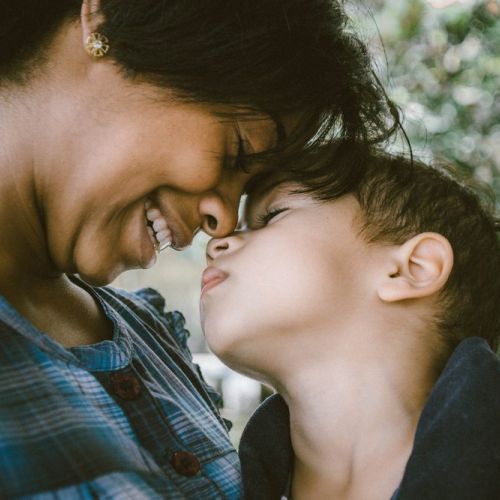It's time to end lung cancer stigma for good
By Sylvia Lee | Originally published 23 November 2022
Updated 1 November 2023

Patient advocate and stage 4 lung cancer survivor Michel Itel with one of his daughters.
In Australia, an estimated 14,529 people will be diagnosed with lung cancer, the fifth most commonly diagnosed cancer, by the end of this year.(1)
The 5-year survival rate of 19% for all lung cancers means that just 1 in 5 people will survive the first 5 years following their diagnosis.(2)
Despite its status as the leading cause of death from cancer in Australia and the rest of the world,(3) lung cancer remains one of the most stigmatised and underfunded cancers, with many mistakenly believing it is solely a smoker’s disease.
Unfortunately, patients are often diagnosed in advanced stages when the cancer has already spread, which can be attributed to stigma, lack of awareness and the vagueness of symptoms.
The cost of lung cancer stigma

Theo Theodosi in hospital whilst undergoing treatment for stage 3 lung cancer.
65-year-old Sydney father and physiotherapist Theo Theodosi remembers his guilt over receiving a lung cancer diagnosis in 2017.
As a former smoker, Theo had suspected he might have lung cancer for some time. He had a dry cough and was experiencing shortness of breath and wheezing. He coughed up blood on two occasions and even dreamt that he had lung cancer.
Regret, guilt and shame led Theo to hide his symptoms at all costs. He avoided visiting the doctor, fearing there was a truth to his suspicions.
It wasn’t until he was admitted to hospital that Theo’s worst nightmare was confirmed. Days after suffering a stroke at his private physiotherapy practice, he was diagnosed with stage 3 non-small cell lung cancer with metastasis in his lymph nodes.
That’s when all the uncomfortable ‘did you smoke?’ questions started.
People diagnosed with lung cancer often face judgemental questions about their smoking history before they’re asked about their welfare and whether they need support.
"The perception that people with lung cancer are responsible for their disease contributed to the negative stigma associated with my lung cancer."
A 2017 survey conducted by Lung Foundation Australia reveals that 35% of people perceive those living with lung cancer to be their “own worst enemy” who “have only themselves to blame”.(4)
“The perception that people with lung cancer are responsible for their disease contributed to the negative stigma associated with my lung cancer,” Theo said.
Compared to other cancers, there is a higher prevalence of psychological distress and poor mental health amongst people living with this disease, with 30% reporting that they blame themselves for their diagnosis.(5)
“The stigma around lung cancer holds people back from talking about their illness. There's a lot of shame and self-blame,” said A/Prof Venessa Chin, Theo’s oncologist and an early-career researcher specialising in immunotherapy research of lung and head and neck cancers.

Stage 3 lung cancer survivor Theo Theodosi with his daughter, Alexandra, and wife, Lana, on holiday in Italy this year.
Thanks to Dr Chin’s proposed treatment of Keytruda, a new immunotherapy drug used in clinical trials that is less toxic than conventional lung cancer therapies, Theo is now in complete remission and looking forward to celebrating his 65th birthday in a few months.
Though he’s out of the woods, Theo maintains the importance of addressing myths around lung cancer and supporting lung cancer research, which only receives a fraction of funding despite its high burden of disease.(6)
“Without the cancer research that led to Keytruda being used for my treatment, I would likely be dead. It is important to draw public awareness of new advances and new research in the treatment of lung cancer.
“It is not just a smoker’s disease. Pollution, occupational exposure and genetics can also be risk factors. Unfortunately, the low survival rate also means that there are few survivors who can push for more public attention.”
The rise of non-smoker diagnoses
In Australia, it is estimated that 16.1% of men and 28.9% of women diagnosed with lung cancer between 2017-2026 are non-smokers.(7) Some international studies suggest there is a global trend of rising diagnoses in non-smokers.(8)

A/Prof Venessa Chin has been investigating the phenomenon of non-smokers being diagnosed with lung cancer.
A current Cure Cancer grantee, A/Prof Venessa Chin’s grant is funded by the Denton Family Trust, in partnership with St Vincent’s Curran Foundation. Based at St Vincent’s Hospital Sydney and The Garvan Institute of Medical Research, she is currently investigating genetic and immune cell differences between never-smokers with advanced lung cancer to their normal, healthy counterparts through the use of single cell sequencing and sophisticated bioinformatics tools.
“The hypothesis is that our bodies react to the environment differently, which can have implications for disease. We know the lungs are exposed to toxins in the air all the time and that lung cancer can develop depending on how people respond to those toxins.”
“There is a real, genuine rise in incidence of lung cancer in patients who've never smoked, and it's not just because the rates of smoking are falling. This is particularly challenging for patients who've never touched a cigarette in their lives, and suddenly they’ve developed advanced lung cancer,” Dr Chin said.
Living with stage 4 lung cancer as a non-smoker

Michel Itel receiving treatment for advanced lung cancer at hospital.
Since his world-shattering stage 4 diagnosis 7 and a half years ago, Michel Itel has made it his mission to advocate for people living with lung disease.
“I remember sitting in my doctor’s office in absolute disbelief. I wasn’t a smoker. I was fit and healthy. How did I get here?” he said.
Michel is a 50-year-old Brisbane-based father and business manager who says that more needs to be done to support others like him who are living with lung cancer.
“I have friends with the same diagnosis and treatment who are literally dropping off like flies. We're battling to get more funding and recognition that we need help.”
A recent study surveyed 79 specialist centres that make up 72% of all centres known to specialise in lung cancer treatment in Australia, and found widespread deficiencies in staffing and services. Nearly a quarter of centres lack access to specialist surgeons and less than half the centres have a specialist nurse, which significantly affects patient wellbeing and outcomes.(9)
"I have friends with the same diagnosis and treatment who are literally dropping off like flies. We’re battling to get more funding and recognition that we need help."

Patient advocate Michel Itel with Cure Cancer alumnus and fellow collaborator Dr Arutha Kulasinghe at the World Lung Cancer Conference in Vienna this year.
Referring to the critical shortage of specialist lung cancer nurses compared to other cancers,(10) Michel says, “It's a slap in the face. It's an inequality of opportunity and inequality of outcome. We’ve got to find a way to change that.”
Michel’s reality of being terminally ill has only emboldened his passion to be a voice for others at the national and international level. He stresses the importance of involving patients, communities, researchers, and policymakers in conversations about lung cancer.
“We need your help to send the right message. There's no better way to turn over stigmas and misconceptions through one-on-one conversations and correcting others in a positive, productive way to shine a light on your disease.
“You'll be amazed by how quickly we can create change when each of us has that conversation with someone.”
"You call it research, we call it hope. Without that hope, we can no longer dream of living as much of a normal life as we can."
- Michel Itel
A breakthrough in lung cancer research is what gives hope to people like Michel. By making a donation today, you will help emerging researchers discover life-changing therapies for people affected by lung cancer.
References
- Cancer Australia. Lung cancer in Australia statistics [Internet]. 2022 [cited 2022 Nov 8]. Available from: https://www.canceraustralia.gov.au/cancer-types/lung-cancer/statistics
- Australian Institute of Health and Welfare. Cancer data in Australia [Internet]. 2022 [cited 2022 Nov 16]. Available from: https://www.aihw.gov.au/reports/cancer/cancer-data-in-australia/contents/cancer-survival-data-visualisation
- Sung H, Ferlay J, Siegel RL, et al. Global cancer statistics 2020: GLOBOCAN estimates of incidence and mortality worldwide for 36 cancers in 185 countries. CA Cancer J Clin [Internet]. 2021 May [cited 2022 Nov 16];71(3):209-249. Available from: https://pubmed.ncbi.nlm.nih.gov/33538338
- Lung Foundation Australia. Stigma research reveals its true extent and impact on people with lung disease [Internet]. 2017 [cited 2022 Nov 18]. Available from: https://lungfoundation.com.au/news/stigma-research-reveals-its-true-extent-and-impact-on-people-with-lung-disease
- Lung Foundation Australia. Making lung cancer a fair fight: a blueprint for reform. [Internet] Milton (AU): Lung Foundation Australia; 2018 [cited 2022 Nov 19]. Available from: https://lungfoundation.com.au/wp-content/uploads/2018/10/Information-Paper-Making-Lung-Cancer-A-Fair-Fight_A-Blueprint-for-Reform-Oct2018.pdf
- Cancer Australia. Cancer Research in Australia 2016 to 2018 - opportunities for strategic research investment. [Internet] Sydney (AU): Cancer Australia; 2016 [cited 2022 Nov 19]. Available from: https://www.canceraustralia.gov.au/sites/default/files/publications/cancer-research-australia-2016-2018-opportunities-strategic-research-investment-summary/pdf/2016_research_review_highlights_final.pdf
- Cheng ES, Weber MF, Steinberg J, et al. Evaluating risk factors for lung cancer among never-smoking individuals using two Australian studies. J Cancer Res Clin Oncol [Internet]. 2022 May 27 [cited 2022 Nov 19];148:2827-2840. Available from: https://link.springer.com/article/10.1007/s00432-022-04043-9
- Dubin S & Griffin D. Lung cancer in non-smokers. Mo Med [Internet]. 2020 Jul-Aug [cited 2022 Nov 19];117(4):375-379. Available from: https://www.ncbi.nlm.nih.gov/pmc/articles/PMC7431055
- Brims FJH, Kumarasamy C, Nash J, et al. Hospital-based multidisciplinary lung cancer care in Australia: a survey of the landscape in 2021. BMJ Open Respir Res [Internet]. 2022 Jan [cited 2022 Nov 19];9(1):e001157. Available from: https://pubmed.ncbi.nlm.nih.gov/35039312
- Lung Foundation Australia. Lack of access to lung cancer nurses is putting Australians at risk [Internet]. 2019 [cited 2022 Nov 19]. Available from: https://lungfoundation.com.au/news/lack-of-access-to-lung-cancer-nurses-is-putting-australians-at-risk










